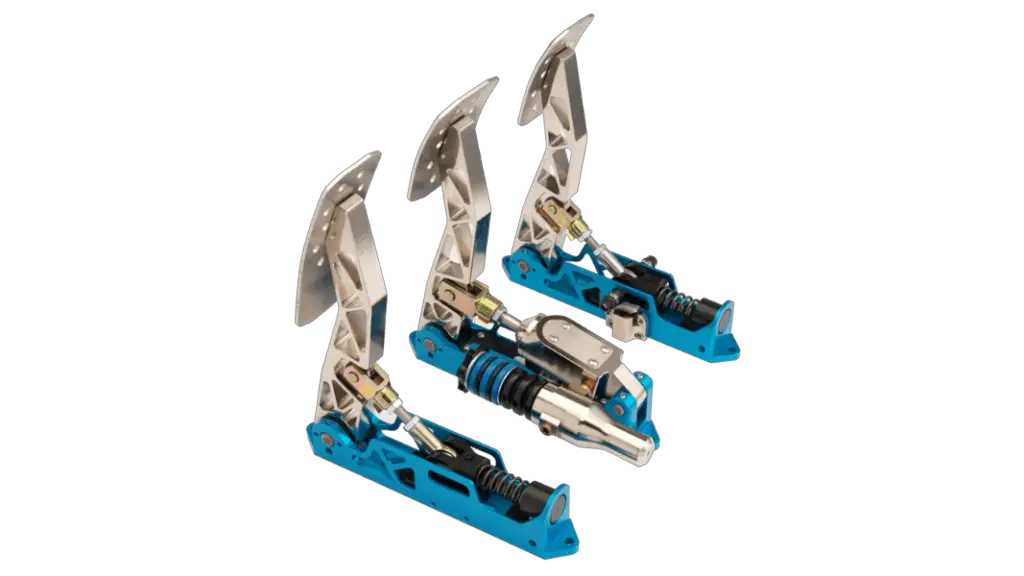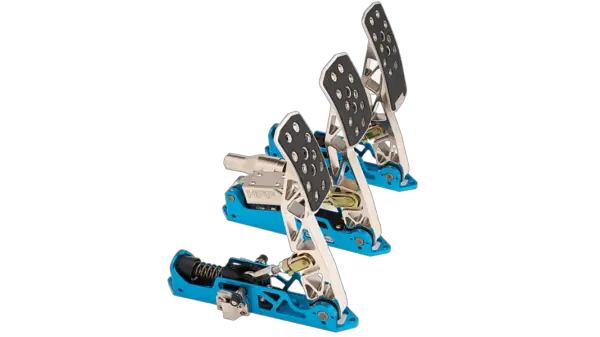Most sim racing players would agree that the true charm of sim racing lies in how well it emulates the real deal. Although that is the point of this gaming format, there are always limitations depending on the games you play and the equipment you use. We heard extensive praise for HPP sim racing pedals when we first started playing and decided to try them out before building our sim racing rig.
The pedals were great, and we were pleasantly surprised by the performance. Therefore, we did what any typical gamer would do if they were in our position. We decided to try several to get an objective point of comparison for a potential review.
Thankfully, we succeeded and have decided to use our experience to give other gamers comprehensive details about our experience with HPP sim racing pedals.
How Accurate Is Pedal Control in Sim Racing?
The short answer is, yes, pedal control is accurate in sim racing, sometimes to the extent of changing the gaming style.
The decision to add pedals has always been difficult, and we understand the reason. We were pretty good at car racing games when we were younger, and I like to think I was especially good at handling several types of cars in the games.
However, driving cars through keyboards is never the same as managing them through pedals, steering wheels, joysticks, etc. I remember feeling a little anxious the first time I tried sim racing pedals because I had no idea if I’d be able to pull them off, despite being a fully licensed driver.
How Does That Affect the Gaming Experience?
The accuracy of sim racing pedals takes time to get used to, especially since few people have experience driving at those speeds. Professional car racing drivers and coaches are typically the best at managing the controls from the beginning, while other players need extensive practice to get the hang of things.
Don’t Pedals Come With Steering Wheels?
Several brands include sim racing pedals in the steering wheel package they offer, but that’s not always the case. If you’re unsure about the pedal you install in your sim racing rig, opt for those deals, and you will be happy with a good option.
However, we recommend keeping your steering wheel and pedals separate, especially since HPP sim racing pedals aren’t part of such deals.
How Many Pedals Does HPP Offer?
HPP has two main types of pedal variants, the JBV and the PRX series. The company stopped manufacturing the PRX series in 2019 when they launched their JBV series, so you won’t find new PRX pedals in the market but can check the second-hand markets for resales.
However, there is no support for the PRX series now, so we recommend JBV instead.
JBV 2 Pedal System
The JBV series offers two types of pedal systems. The 2 pedal system imitates automatic cars providing drivers with an accelerator and brake for control. It is pretty reliable and responsive, providing nearly the exact control you’ll get when driving a real automatic car.
JBV 3 Pedal System
The JBV 3 Pedal system imitates the manual car and is the real star. Although automatic vehicles are famous for general driving, professional racers prefer cars with both automatic and manual setups.
Power is the primary reason for this preference since manual transmission is significantly more powerful than automatic. Therefore the JBV 3 pedal system has higher demand among racers who participate in sim racing championship events.
Additionally, Motion Simulation Ltd. recently bought HPP Simulation and has announced that they will continue production and support for the JBV series. They will not be producing PRX and will offer support only as a courtesy, so it is better not to opt for it.

Customer Review for HPP Sim Racing Pedals (JBV 3)
Now that you have a fair idea about HPP sim racing pedals and pedals in general let’s move on to the review. We love professional racing games, so we decided to try the JBV 3 since that’s the closest we will get to driving a real race car.
Price
The JBV 3 isn’t cheap. These HPP sim racing pedals cost over $1,000, which is a significant investment. However, they are also some of the best in the market, and most options that are equally good are either similarly priced or more expensive.
So, you will end up spending this much eventually if you want the same quality.
Core Technology and Response
The JBV series was designed to match the hydraulic system response, giving optimal control. HPP developed the series using a premium pressure transducer, enabling them to recreate the braking experience accurately.
You’ll feel the fluidity and quickness when you press the pedal and see the car respond accordingly. The design is also reliable and durable, so you won’t have to worry about replacing parts any time soon.
The acceleration also depends on the engine, so focus on how it affects the brakes more. The brakes become especially important during competitive racing because they support maneuvering and keep the car on the track.
Material
The JBV series designers used aluminum to make the product, which was brilliant. The metal is exceptionally durable and robust but lightweight. That makes it easier to maintain them without worrying about the force you’ll have to apply to get the pedals to work according to your will.
Heavy metallic frames are never ideal for sim racing pedals because they will likely slow you down, so always choose the lighter models.
Compatibility
Compatibility refers to two avenues:
- Game compatibility
- Sim Racing Equipment Compatibility
The last thing you want is for your expensive pedals to not sync with the F1 cars you want to use for iRacing events. Thankfully, that’s not the case for the HPP JBV series. The pedals are compatible with all the major racing games you’d want to play, especially the ones that attract talented sim racing players.
Next is sim racing equipment compatibility. While we don’t know if the pedals are compatible with all available sim racing equipment, we didn’t come across any they weren’t compatible with. We also tried looking for compatibility information on the internet and didn’t find any cause for concern.
Adjustability
There are several adjustment options in the JBV series to accommodate spring tension and car types. This adjustability optimized the player experience and made it easier for us to adjust to the control system.
It is also worth noting that such features are rarely available in pedal systems that fall under similar price ranges, so we were pleasantly surprised.
Impact on Performance
That depends entirely on how well you master the 3 pedal system. Most professional players prefer both automatic and manual transmissions to be present in cars because they want the flexibility of adding power when they need to.
You’ll need to learn how they use the system to increase speed and follow the same pattern. Additionally, the hydraulic system will provide the necessary support, so you can expect good results.
Wrapping Up
Overall, the HPP sim racing pedals are a worthwhile investment, and we recommend you get them for your sim racing rig. You can also check out our other articles for more information about sim racing.

